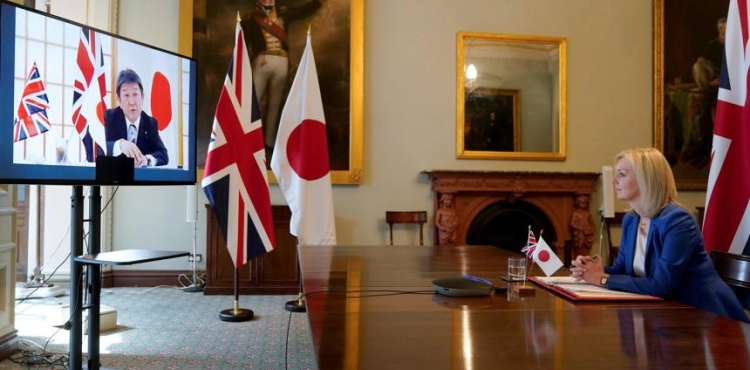Britain, Friday, extracted from Japan its first "big" trade agreement since Brexit, after a week of sharp differences with the European Union, which raised fears that negotiations on their future relationship would fail, which would pose a threat to its economy.
London welcomed this "historical moment" while its relations with the European Commission appear to be at their worst, burdened by chronic disputes over the terms of their future cooperation, especially the British desire to return from the exit agreement in what was considered a violation of international law.
"The United Kingdom concluded a free trade agreement with Japan, which is the first major trade deal for the country as an independent country on the commercial level," the British Ministry of International Trade said in a statement.
"We have regained control of our trade policy and will continue to thrive as a trading nation outside the European Union," British Conservative Prime Minister Boris Johnson wrote on Twitter.
The text to increase trade with Japan by about 15.2 billion pounds sterling is a "preliminary agreement" between British International Trade Minister Liz Truss and Japanese Foreign Minister Toshimitsu Motegi.
The agreement is supposed to enter into force on January 1. It would allow for duty-free treatment of 99 percent of British companies´ exports. It will especially benefit the industry, food industry and technology sectors.
Lise Truss emphasized that the agreement "goes far beyond the current agreement with the European Union."
The agreement between the European Union and Japan, the largest bilateral trade agreement ever, came into effect in 2019 and now also includes Britain, which remains subject to European rules during a transitional period until the end of December.
"It was really difficult negotiations, but we reached an initial agreement in about three months, which is a fast pace we have not experienced," said Toshimitsu Motegi, adding that he had "improved" his country´s access "to the UK market for train cars and some auto parts."
"The agreement with Japan may be the first in a long line" of agreements, said Caroline Fairbairn, executive director of the largest employers´ organization.
After leaving the European Union on January 31 after three and a half years of the referendum to end a relationship that lasted nearly half a century, the United Kingdom wants to raise the banner of free trade through agreements covering eighty percent of its foreign trade by 2022.
It seeks agreements to replace those between the European Union and other countries in the world.
It has already reached agreements with South Korea, Chile, Switzerland, Iceland and Norway, which make it possible to maintain the conditions governing trade with these countries after Brexit.
Britain is seeking to reach an agreement before the end of the year with the United States, as well as especially with the 27 European Union countries, which represent nearly half of its foreign trade.
But the lack of trust with the countries of the Union is in full swing after Britain on Thursday rejected a final ultimatum to very worried Europeans, that London would return before the end of September about its intention to pass a bill that partially contradicts the agreement governing exit from the European Union.
The government intends to launch procedures for approving the controversial text next week, but it will have to confront a rebellion, part of its camp worried about a blow to British credibility in the international arena.
This disagreement increases the difficulties that both parties face in overcoming their differences over their future relationship.
A new session of negotiations ended Thursday with the parties trading accusations of causing lack of progress.
And the German ambassador to the United Kingdom, Andreas Michaelis, wrote in a tweet on Twitter, "During more than thirty years of diplomacy, I have not seen a deterioration in the negotiations so quickly, deliberate and profound."
The former partners say, however, that they are "determined" to reach a free trade agreement while avoiding quotas and tariffs. The discussions are supposed to resume next week in Brussels.
If no settlement is reached on January 1, the stricter rules of the World Trade Organization will be enforced, with higher tariffs imposed.
And such a break in exchanges threatens to weaken an economy that is essentially going through a historic crisis due to the new Corona virus.












